german
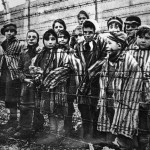 Many of the history books of today try to remove or minimize the Holocaust, and some people don’t even believe that it was real, but that couldn’t be further from the truth. The Holocaust took place between 1941 and 1945. In 1933, the Nazis came into power in Germany and they believed that the Germans were a superior race. They were completely against any people of different backgrounds…especially the Jewish people, who they felt were an inferior race, and were a danger to the German Racial Community. During the Holocaust, the Jewish people were systematicaly removed from their homes, made to be slaves, used for scientific experiments, and many died or were killed in the Gas Chambers.
Many of the history books of today try to remove or minimize the Holocaust, and some people don’t even believe that it was real, but that couldn’t be further from the truth. The Holocaust took place between 1941 and 1945. In 1933, the Nazis came into power in Germany and they believed that the Germans were a superior race. They were completely against any people of different backgrounds…especially the Jewish people, who they felt were an inferior race, and were a danger to the German Racial Community. During the Holocaust, the Jewish people were systematicaly removed from their homes, made to be slaves, used for scientific experiments, and many died or were killed in the Gas Chambers.
On this day in 1942, a stunning 4,300 Jews are deported from the Polish town of Chelm to the Nazi extermination camp at Sobibor, where all are gassed to death. Between 1942 and 1943, there were about 250,000 Jewish prisoners who lost their lives in the five gas chambers housed there. Then in October 1943, a 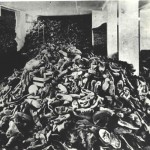 camp revolt occurred…300 Jewish slave laborers rose up and killed several members of the SS…Schutzstaffel (German translation: “Protective Echelon), as well as Ukrainian guards. The rebels were killed as the battled against the guards or tried to escape. The remaining prisoners were executed the very next day. I can’t even begin to imagine what incredible bravery it took to even make such an attempt. They had no weapons with which to engage in a battle. They were simply fighting for their lives, knowing that they would most likely lose. It was better to fight and die, than to live this way.
camp revolt occurred…300 Jewish slave laborers rose up and killed several members of the SS…Schutzstaffel (German translation: “Protective Echelon), as well as Ukrainian guards. The rebels were killed as the battled against the guards or tried to escape. The remaining prisoners were executed the very next day. I can’t even begin to imagine what incredible bravery it took to even make such an attempt. They had no weapons with which to engage in a battle. They were simply fighting for their lives, knowing that they would most likely lose. It was better to fight and die, than to live this way.
Also on this day, the German firm IG Farbe set up a factory just outside Aushwitz in order to take full advantage of the Jewish slave laborers from the Auschwitz concentration camps. IG Farben was a German chemical industry conglomerate. Its name is taken from Interessen-Gemeinschaft Farbenindustrie AktienGesellschaft which literally means “community of interests” of, in this case dye-making corporations. In addition to exploiting the Jewish slave labor for its oil and rubber production, IG Farben performed drug experiments on the slaves. Tens of 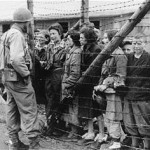 thousands of the slaves would lose their lives to the brutal work conditions and savage treatment received from the guards. In the aftermath, several of the firm’s officials would be convicted of plunder, spoilage of property, forced slave labor, and inhumane treatment of civilians and prisoners of war. The firm went under Allied control for the purpose of completely dismantling it, because it was a threat, but as resolve weakened, the firm was eventually divided into three companies, Hoechst…a chemical and pharmaceutical company, Bayer…a company we all know, and BASF…Badische Anilin und Soda Fabrik, also a chemical company. I suppose that one could say that in the end, some good came from these companies, but knowing their history tends to make it a little difficult to get past their origin, or their complete and total disregard for human life in the past.
thousands of the slaves would lose their lives to the brutal work conditions and savage treatment received from the guards. In the aftermath, several of the firm’s officials would be convicted of plunder, spoilage of property, forced slave labor, and inhumane treatment of civilians and prisoners of war. The firm went under Allied control for the purpose of completely dismantling it, because it was a threat, but as resolve weakened, the firm was eventually divided into three companies, Hoechst…a chemical and pharmaceutical company, Bayer…a company we all know, and BASF…Badische Anilin und Soda Fabrik, also a chemical company. I suppose that one could say that in the end, some good came from these companies, but knowing their history tends to make it a little difficult to get past their origin, or their complete and total disregard for human life in the past.
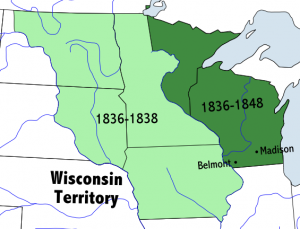 My life began in Superior, Wisconsin. Superior is a small town located at the tip of Lake Superior, which is the largest of the Great Lakes. I have always felt close ties to Superior and to Wisconsin, in general, because while I have not lived there since I was three years old, it was the place of my birth, and the place where my Uncle Bill Spencer and his family lived for many years, as well as many of my great grandparents’ family.
My life began in Superior, Wisconsin. Superior is a small town located at the tip of Lake Superior, which is the largest of the Great Lakes. I have always felt close ties to Superior and to Wisconsin, in general, because while I have not lived there since I was three years old, it was the place of my birth, and the place where my Uncle Bill Spencer and his family lived for many years, as well as many of my great grandparents’ family.
In the early years of the area, the Native American Indian Tribes called it home. The first Europeans to live there were the British and French, and the American settlers who lived in Wisconsin when it was a territory. One tribe, the Meskwaki Indians were particularly hostile toward the French, but many of the Indians got along well with the pioneers. The Great Lakes area increased dramatically after the decline of the British influence following the War of 1812. This was a land with a mix of pioneers and Indians. Of course, like most areas, the Indians were eventually placed on reservations.
Like every state in the United States, Wisconsin started as a US Territory, and when there were enough people to make statehood a necessity, each one became a state. Wisconsin initially became a terriroty on this day, April 20, 1836. Initially, it included all of the present-day states of Wisconsin, Minnesota, Iowa, and part of the Dakotas east of the  Missouri River. Much of that territory was part of the Northwest Territory, which was ceded by Britain in 1783. The portion which is now the Dakotas was originally part of the Louisiana Purchase. Eventually, the states would separate their areas, leaving Wisconsin with the area it now occupies.
Missouri River. Much of that territory was part of the Northwest Territory, which was ceded by Britain in 1783. The portion which is now the Dakotas was originally part of the Louisiana Purchase. Eventually, the states would separate their areas, leaving Wisconsin with the area it now occupies.
My people would arrive in the area much later, but many of them would stay in the area of Wisconsin and Minnesota for generations, and even to this day. For me, there will always be a place in my heart for Wisconsin, especially Superior, and the Great Lakes, especially Lake Superior. It is a beautiful area that my family has called home for generations, and I will always love it.
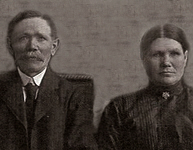 My great grandparents, Carl and Albertine Schumacher immigrated to the United States from Germany, before they even knew each other. When they arrived, they, like most immigrants, could not speak English very well. It made communication difficult in those early years. Eventually, they learned enough English to get by, but the family still spoke German in the home. German continued to be the home language for many years. In fact, it would take a teacher at the school where their two oldest children, Anna and Albert attended, who made fun of their language, to change their home life forever. When the children came home upset about the thoughtlessness of the teacher, my great grandmother, said, “That’s it!! From now on, this family will speak only English in this house!” She did it to protect her children from further ridicule, but looking back on that time now, I think it is a bit sad that the German language that had been a part of their heritage for generation and generations, was now lost forever. I know that my great grandparents probably always remembered the language, but for their children much of it was lost, and for their children, it was completely lost.
My great grandparents, Carl and Albertine Schumacher immigrated to the United States from Germany, before they even knew each other. When they arrived, they, like most immigrants, could not speak English very well. It made communication difficult in those early years. Eventually, they learned enough English to get by, but the family still spoke German in the home. German continued to be the home language for many years. In fact, it would take a teacher at the school where their two oldest children, Anna and Albert attended, who made fun of their language, to change their home life forever. When the children came home upset about the thoughtlessness of the teacher, my great grandmother, said, “That’s it!! From now on, this family will speak only English in this house!” She did it to protect her children from further ridicule, but looking back on that time now, I think it is a bit sad that the German language that had been a part of their heritage for generation and generations, was now lost forever. I know that my great grandparents probably always remembered the language, but for their children much of it was lost, and for their children, it was completely lost.
When I was in school, I fell in love with the German language, and took it in school for four years. It was so interesting to me to speak the German language, but the biggest problem was that I had no one to speak it with at home. I can see how speaking one language in the home and another at school could have become a problem for my grandmother and great uncle. It would be hard for them to learn English when German was spoken in the home. I know that the opposite made it very hard for me. The only time I got to speak German was the hour I had class each day. It would be especially confusing for younger children. Nevertheless, I think it could be done, and would have been beneficial for all of the children.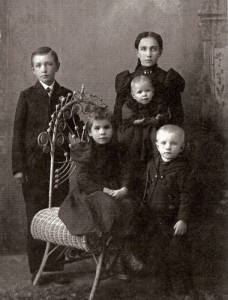
Over the years, I have been an advocate for English being our countries official language, and I still feel that way, but I also think it is great when people can speak more than one language. In my opinion, it is rude to speak another language in the company of people who cannot speak it back, because they invariably get the feeling that you are talking about them, and perhaps you are. Even if you aren’t, they will always believe you were. That is why I think it is important to consider those around you when choosing to speak a language that is not the common one to the area you are in. Of course, when you are not in a conversation with those around you, like in a grocery store, it’s a different thing. I think people should pass their heritage, culture, and language down to children and grandchildren, because it will never be something they regret giving them, but it is also important to embrace their new home when they immigrate, because that is where you will live, work, and socialize from then on.
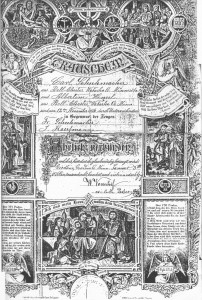 After reconnecting with so many of my Schumacher cousins on Facebook, Ancestry, and now in person, I have begun to wonder more about the Schumacher ancestry even further back. For a number of years, I have been stuck in the 1800’s on the Schumacher side of the family, just hoping for a break, and I think I may now know why. In researching the name Schumacher, I find that Schumacher or Schuhmacher is an occupational surname. It is, of course, the German word for shoemaker. Both spellings can be used as surnames, with Schumacher being the more common one, however, only the variant with an “h” can also be used as a job description in modern German spelling. That fact is of vital importance to my family’s actual history, and it could be the reason I have hit a wall in my search.
After reconnecting with so many of my Schumacher cousins on Facebook, Ancestry, and now in person, I have begun to wonder more about the Schumacher ancestry even further back. For a number of years, I have been stuck in the 1800’s on the Schumacher side of the family, just hoping for a break, and I think I may now know why. In researching the name Schumacher, I find that Schumacher or Schuhmacher is an occupational surname. It is, of course, the German word for shoemaker. Both spellings can be used as surnames, with Schumacher being the more common one, however, only the variant with an “h” can also be used as a job description in modern German spelling. That fact is of vital importance to my family’s actual history, and it could be the reason I have hit a wall in my search.
According to my grandparent’s, Carl and Albertine (Henriette) Hensel Schumacher, marriage certificate, Carl’s last name was actually spelled Schuhmacher…the actual job description, as well as an occupational surname. I had long known of the difference in the spelling, because my Uncle Bill Spencer had sent me a copy of the marriage certificate years ago, but I didn’t know the distinction that one letter held. I didn’t know that it changed the name from just a name to an occupation. If, as I suspect, Carl was encouraged to Americanize the spelling when he came to America, then anyone searching for information on Carl Schuhmacher, would most likely hit a wall…just as I have done. Americanizing surnames was a very common practice in early American immigration history, and sometimes the name the person ended up with was nothing like their real name. It is a serious frustration for the family history researcher.
This now causes me to wonder if our family might be related to such notable people as Eugen Schuhmacher (1906–1973), German zoologist and pioneer of animal documentaries, Irma Heijting-Schuhmacher (born 1925), Dutch freestyle swimmer, or John Schuhmacher (born 1955), American football player. Perhaps our 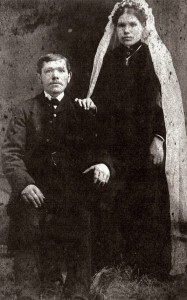 search for our roots should be heading in a completely different direction, because unfortunately, no one told the people in the nation these people immigrated from that they should change their name too, so the lineage would be preserved. Perhaps this spelling of the name will open the doors that have for so long been locked. Only time will tell on this matter, as I delve into the research to see where it will lead me. I hope that it will lead me to the next level…the one after Carl’s dad, my 2nd great grandfather, Johann Schuhmacher, and beyond.
search for our roots should be heading in a completely different direction, because unfortunately, no one told the people in the nation these people immigrated from that they should change their name too, so the lineage would be preserved. Perhaps this spelling of the name will open the doors that have for so long been locked. Only time will tell on this matter, as I delve into the research to see where it will lead me. I hope that it will lead me to the next level…the one after Carl’s dad, my 2nd great grandfather, Johann Schuhmacher, and beyond.
It is so hard for me to hit a brick wall in the family history line, because I want so badly to be able to take each line way back. It has become an obsession I suppose, just like it was for Uncle Bill. Once you get started you don’t want to stop until you reach your goal. Ancestral lines can be hard enough to follow, as the records kept were not as good, or have been lost over the years, but when you add the fact that the names were most likely changed, you find yourself hitting the brick wall that I have hit. Just like the grade school child who spells a totally different word for the teacher, you find yourself realizing the importance of one letter.
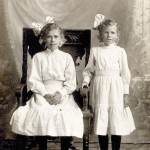 These days, with most towns having multiple schools, our school days are often taken for granted, and even viewed…by many students and boring, grueling, and basically something to get through and over with, so they can move on to real life. But, schooling in the old west, and even into the mid 1900’s wasn’t always such an easy thing to accomplish. As our nation grew, and people spread out across its vastness, schools were one thing in short supply. Many parents had to home school their children, which is becoming more of a luxury item these days, because with home schooling, comes the loss of one income, and many people can’t or don’t want to make it on one income.
These days, with most towns having multiple schools, our school days are often taken for granted, and even viewed…by many students and boring, grueling, and basically something to get through and over with, so they can move on to real life. But, schooling in the old west, and even into the mid 1900’s wasn’t always such an easy thing to accomplish. As our nation grew, and people spread out across its vastness, schools were one thing in short supply. Many parents had to home school their children, which is becoming more of a luxury item these days, because with home schooling, comes the loss of one income, and many people can’t or don’t want to make it on one income.
When my great grandparents, Carl and Henriette Schumacher moved their family from Minnesota to North Dakota, they were quite a way from the school, but they saw the importance of educating their children. The family spoke German at home, and when the older children started school, the teachers made fun of their lack of the knowledge of the English language. Henriette immediately set out to change that. German would no longer be spoken in the home. The whole family would make the switch to English. The distance to school was a big problem, but Carl made sure that his children were there…no matter what.
That worked well for the older children, but at that time in history, many children didn’t go to school after the 6th grade, and some quit sooner. So, when Bertha and Elsa, the youngest children were in school, a new problem presented itself. The school was nearer to them now, but often there were not enough students to warrant keeping it open, thus their education became hap-hazard. That is not to say that they did not get their education, because they did, and even went on to college. Theirs was just a little bit different than their older siblings.
Bertha tells of going to school in the small school, with very few students, but she also talks of the year they were home schooled but their oldest sister, my future grandmother, Anna. She talks of the time that they spent in a small house in Lisbon, with Mina staying with them so they could go to school. And of course, there were the times they went by horse and buggy into school. Those were hard times, and I have to wonder how the girls kept up with the other students, and were able to continue on to the high school in Lisbon. It’s not that I wondered about my grandmother’s ability to teach, but with little or no regulation, how did the school in Lisbon know anything about their prior education.
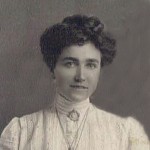
I suppose they had to take some kind of test or visit with the teacher for a time so they could determine where they were in their education, and therefore could be placed in one grade or another. I know that often in homeschooling situations today, the students are ahead of their age group, but I still wonder if that was the case then, because their materials were few and there was really no clear way to know if the teacher was keeping up with other classes for their pupils’ age groups. Those must have been hard and confusing times for Bertha and Elsa. Nevertheless, they both finished school, like their older siblings, and went on to college, but their education was definitely at The School of Hap-Hazard.
 Ah, here it comes…the wearin’ of the green, corned beef and cabbage, and green beer for those who like that…Saint Patrick’s Day. It’s a day for partying…and pinching for those who forget to wear green. Most people look at Saint Patrick’s Day as just another party day. And I enjoy the pinching games and the corned beef and cabbage, but I’ll leave the green beer for others.
Ah, here it comes…the wearin’ of the green, corned beef and cabbage, and green beer for those who like that…Saint Patrick’s Day. It’s a day for partying…and pinching for those who forget to wear green. Most people look at Saint Patrick’s Day as just another party day. And I enjoy the pinching games and the corned beef and cabbage, but I’ll leave the green beer for others.
One thing that Saint Patrick’s Day does make me think of, however, is my Irish background. I think most of us have a little Irish background, and some have a lot. You can usually find it by the last names, like Bob’s grandmother, whose name before her marriage was Leary, or my great grandmother, whose maiden name was Shaw. Many of these ancestors really never knew very much of their Irish roots, because their families have been in the United States for centuries. I don’t remember either of these grandmothers ever mentioning Irish roots, or being particularly Irish.
Still, many people whose Irish traditions, or any other traditions common to their countries, 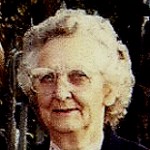 have been passed down from generation to generation, feel a deep attachment to the past and to their roots. Anytime you look back at your family history, you can’t help but feel the beginnings of an attachment to a different time and a different place. It’s easy to envision what life might have been like then. Days before cars and planes, when people traveled by horse and buggy. Days when moving to a new country meant leaving your family behind forever…never to see them again.
have been passed down from generation to generation, feel a deep attachment to the past and to their roots. Anytime you look back at your family history, you can’t help but feel the beginnings of an attachment to a different time and a different place. It’s easy to envision what life might have been like then. Days before cars and planes, when people traveled by horse and buggy. Days when moving to a new country meant leaving your family behind forever…never to see them again.
Travel wasn’t so easy then. And yet brave people like our ancestors, who wanted to have a better life, set out into the unknown. They had no idea what they would find out there, but they set aside their fears and went anyway. They were pioneers, and were it not for them, we would not be where we are today, or have what we have today. They are also the inventors. Someone had to come up with all of the modern conveniences that we have today. They were people with that same pioneer spirit. What would our world be like without those people and people like them. People who 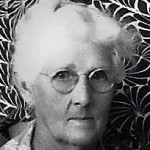 carried their traditions into a new world, or people who came to the new world and started traditions of their own.
carried their traditions into a new world, or people who came to the new world and started traditions of their own.
Much of my background is German and English, but there is some Irish, and the Irish family members that I have had the pleasure of knowing were very much a treasure as valuable as the emerald colored hills of the old country. So I’ll carry on the tradition today. Wearin’ the green, and pinching those who forget, and eating corned beef and cabbage with loved ones. Because, today…everybody is a little bit Irish. Happy Saint Patrick’s Day to all.
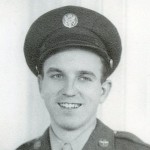 As I continue to read through my dad’s letters to his family during World War II, I have been reading between the lines, and behind the scenes that he was able to share. During a war, the soldiers involved are unable to speak about the operations they are taking part in. Still as young men and women, far away from home, they want and need to write and receive letters. They need the closeness of family, and yet they don’t want to worry their family, and they are bound by military rules, not to talk about the missions. So much so, that letters must be read to make sure no information accidentally gets out.
As I continue to read through my dad’s letters to his family during World War II, I have been reading between the lines, and behind the scenes that he was able to share. During a war, the soldiers involved are unable to speak about the operations they are taking part in. Still as young men and women, far away from home, they want and need to write and receive letters. They need the closeness of family, and yet they don’t want to worry their family, and they are bound by military rules, not to talk about the missions. So much so, that letters must be read to make sure no information accidentally gets out.
Knowing my dad in his later years, and getting to know him through his letters home, I know that he was not a man who wanted others, especially his family to worry about him. So, he never told of pain or fears. Which leads me to believe that my dad wouldn’t have told his family, and especially his mom, what he was feeling during the bombing missions he went on every day. Not even if he could have. That was just the man my dad was…as a young soldier, and as a adult husband and father.
Still, in reading his letters, the need for comfort and reassurance that existed in him every day, whispered quietly from between the lines and behind the words my dad wrote in his letters. He asked for good news concerning men he knew that were in the service too. Hoping that if they were ok, he would be too. Of course, I can’t be sure that those were my dad’s feelings or his thoughts, but I know that is how I felt when I looked at the pictures he took of flak from the German Fliegerabwehrkanone. This was an 88mm gun capable of rapid fire. The resulting shell fragments would rip through the planes and it is said that it took over 3,300 rounds to take down a plane. And those guns did take down planes. The B-17 bombers had to fly through these traps on the way to and from their targets. How could these boys go through that every day and not have fear that they would not come home. I know it took great faith in God to move beyond that fear…to keep going…to survive the  day to day nerve racking missions.
day to day nerve racking missions.
I have great respect for all of our soldiers, because they push their fears back every day, and hide their true feelings from their loved ones so they don’t worry. And yet, when I look at the pictures Dad took of the flak all around their plane, and read the letters telling his family that he is “ok and feeling fine”, which is really a way of saying he is still ok, and not telling them much of anything I think I understand what true bravery is. That was typically my dad, never allowing his feelings to worry his family. I feel that I know my dad better from his letters and it makes me appreciate what a wonderful man he was even more. I love you Daddy!!
 When your birthday happens to be on a holiday, it can be a special thing. Groundhog Day, 103 years ago was one of those special days. That was the day Bob’s grandmother was born. I don’t know if Grandma’s parents looked at her birthday as something special in those early years or not. For me, however, as her granddaughter-in-law, hers was a birthday that I never forgot. It wasn’t that Groundhog Day was any big holiday where I come from, but for me, the coming of Spring means…well, a return to life!!
When your birthday happens to be on a holiday, it can be a special thing. Groundhog Day, 103 years ago was one of those special days. That was the day Bob’s grandmother was born. I don’t know if Grandma’s parents looked at her birthday as something special in those early years or not. For me, however, as her granddaughter-in-law, hers was a birthday that I never forgot. It wasn’t that Groundhog Day was any big holiday where I come from, but for me, the coming of Spring means…well, a return to life!!
I was curious as to whether or not Groundhog day was even something celebrated when Grandma was born, and since I had never researched it before, I decided to look. I found that Groundhog Day began in 1841 when a German shopkeeper named James Morris in Berks County, Pennsylvania, wrote that February 2 was the day the groundhog comes out of his burrow from hibernating. If the day is sunny and the groundhog sees his shadow, he returns to his burrow for six more weeks of hibernation. If the day is cloudy and the groundhog cannot see his shadow, then he ends his hibernation and the weather will be mild. So it was something that was celebrated when Grandma was born.
Still, I don’t know if her parents gave it much thought or not. What I do know is that for her children and grandchildren, it was a special day. Of course, many people like me look at Groundhog Day as the day we hope will point to an early Spring, but for our family it is also the day a very special lady was born. Grandma was the glue that held the family together in the early years, and the one who taught everyone about love. In the later years, her grandchildren and great grandchildren loved to spend time with her too. She made every visit wonderful…an adventure.
Grandma always liked the fact that her birthday was on Groundhog Day. I remember her telling about her birthday, and you could see it on her face. I think grandma liked the Springtime too. What rancher didn’t. Spring always brought the new life. New cows, the garden growing, being able to get outside and enjoy the day…these were things she liked. Her front yard was a place she liked to be, as was her garden. But the place I remember her the most was in her kitchen. Grandma could easily run circles around most people. When breakfast was over, a short break, and it was time to start preparations for lunch…and then dinner.
Even if Grandma’s birthday had not been on a special day, it would always be a special day to us, her family, because it was the day grandma’s life began. Grandma has been gone for 14 years now, but every year on Groundhog Day, I can see her in my mind’s eye…always busy, always smiling, always special.

